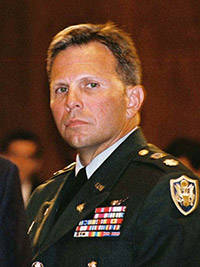
We have a president who understands the difference between an enemy and a competitor, and through this knowledge the correct tools to use in dealing with each.
“Whether we like it or not, we are engaged in a new era of competition,” President Trump said while outlining his national security strategy one year ago.
“American success is not a foregone conclusion,” he warned, but added, “We are declaring that America is in the game and that America is going to win.”
The president’s description of national security rivalries as a form of competition was remarkable because it represented a totally new approach to foreign policy — one that confronts threats head-on while also recognizing that America can benefit from partnerships with its adversaries under the right conditions. From partnerships based on respect, not neglect.
China and Russia, for instance, have both been described and treated as enemies by U.S. policymakers for many years, leading to antagonistic relations that have actually diminished our ability to extract concessions on major disputes. President Trump, on the other hand, has been able to find common ground with both countries while continuing to challenge them on issues that are critical to U.S. security.
“Russia is a foe in certain respects. China is a foe economically,” President Trump explained earlier this year. “But that doesn’t mean they’re bad. It means that they’re competitors … they want to do well and we want to do well.”
This clear-headed approach has been on full display in the form of President Trump’s productive working relationship with President Xi Jinping of China. Meetings between the two leaders have been marked by civility and cordiality, even as they’ve jockeyed for advantage in their ongoing trade negotiations. President Trump has great respect for President Xi, but remains fiercely competitive to force change in our trade relations with the communist nation.
Similarly, even though the president has been at odds with Russia on many fronts, particularly the civil war in Syria, that didn’t stop him from providing Vladimir Putin with intelligence that helped prevent a major terror attack in St. Petersburg.
He was even willing to meet with Kim “Little Rocketman” Jong II to discuss North Korean denuclearization despite the heated public exchange of threats and insults between the two leaders. Instead of trying to buy Kim’s friendship with subsidies, as previous presidents tried to do, Donald Trump treated the dictator as a competitor and got him to make actual concessions to the U.S.
While cooperation has the potential to yield benefits with some rivals, President Trump also knows that other foes are truly “enemies,” and he hasn’t shied away from dealing with them as such.
In less than a year, he crushed ISIS. A terror menace which had grown into the most geopolitically powerful terrorist group in the world under his predecessor’s watch.
He reversed the disastrous nuclear deal with Iran, which gave billions to the Islamic republic which only embolden the mullahs to become more hostile to American interests. And he enforced President Obama’s “red line” in Syria by bombing the air bases that Bashar Assad’s government used to bomb civilians with chemical weapons.
President Trump’s distinction between enemies and competitors stems from his desire to keep our country safe, while advancing our national interests, regardless of political considerations.
“I would rather take a political risk in pursuit of peace than to risk peace in pursuit of politics,” he said during his summit with Russian President Vladimir Putin.
President Trump isn’t like most politicians — he is actually not a politician — he’s willing to forfeit his own political future to do what’s best for America. During the negotiations with North Korea, he even downplayed speculation that he might win the Nobel Peace Prize, saying, “The prize I want is victory for the world.”
President Trump understands that better than anyone how to manage threats and expand opportunities for our national interests worldwide. His foreign policy approach of balancing respect for our competitors with zero tolerance for our enemies is proving to be the formula for American success.


